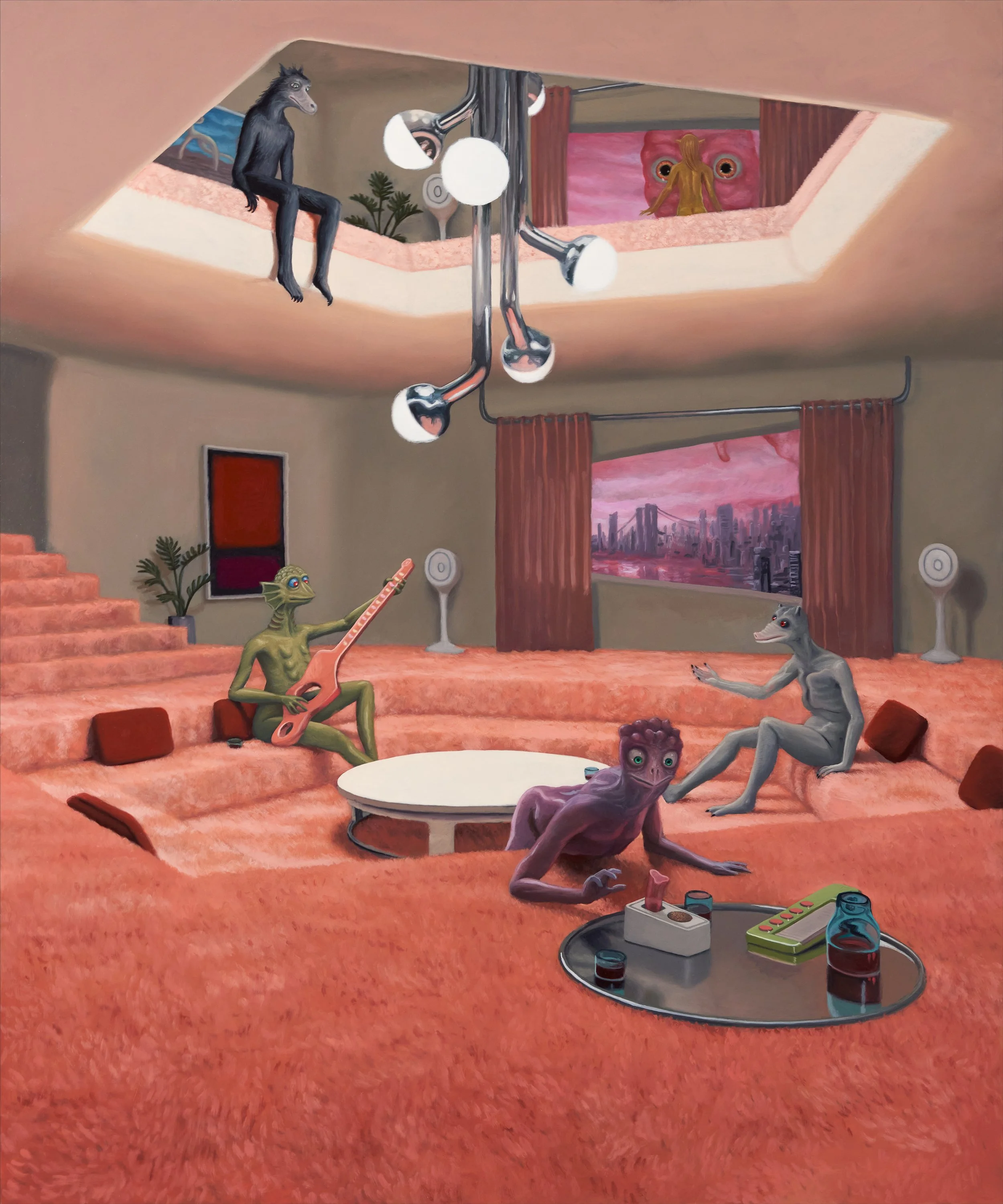Jeremy Olson presents "this time of monsters", his solo show at UNIT, London
Interview: Alina Ferraro
Guilherme Ferrari
We would love to find out a little bit about your roots. You you grew up in Colorado, right?
Yes, I was born in California, and I grew up in Colorado. I went to went to undergrad college in Arizona, and then I moved to New York after that. And I and I've been in New York for a long time. Since 2000. I moved to New York and just got day jobs. And then several years later, I went back to school. I went to grad school in New York at NYU for Art. But there was a gap. I was still making art, but just working and being young.
Your new exhibition is called Time of Monsters, and it's inspired by science fiction, can you tell us more about that?
The name came from a version of one of Antonio Gramsci’s quotes. It goes like, the old is dying and the new cannot be born. Now it's the time of monsters. And so, like, I feel like that's kind of what I was thinking about. My real sense is that we are in a period of indeterminacy and anxiety and I don't think anyone really believes in the current system, but we also don't really see a way out of it, like the the utopian models of the past maybe failed a little bit. I feel like we're in this kind of really confusing dark moment, but it's also exciting because there's potential, unknown potential, I guess. I was thinking about all the works, even though they're all a little bit all over the place, you know, there are some that are more narrative, some that are more formal or gestural even. And obviously, like, there's different mediums of sculpture, paintings. And the sculptures are a completely different thing, but I think what kind of ties them all together is this idea of indeterminacy and of striving towards something that's unknown.
Something new is born. We are going to get to another place, we’re going to be stable again.
I don't know about stable, I have no prediction for the future. I don't necessarily think it's going to be positive. The current system is too overburdened and chaotic.There’s this book called "The End of History” by Francis Fukuyama. I never even read the book, but I feel like it was this idea very in the air that basically liberal capitalism was the solution, like we'd figured it out like, and the only question was, How long would it take for other countries to catch up to the West, and adopt the same policies? And, and then everything would be fine. And there was kind of nowhere else to go. Communism and socialism had failed. This was the only option. And then obviously, like 9/11 happened and then you had the banking crisis of 2008 and now you have what maybe is the start of World War III. So it feels like history is back.
There is a genuine excitement in your paintings. We've reached the point where we're enjoying our nightmares. How can you take such pleasure in a movie in which all humankind is annihilated?
Totally, and I've always been really attracted to horror movies and that kind of stuff. I worked for a long time as a photo retoucher, and product photography. So that was like my day job for quite a while and I feel like there's something about advertising that I think is also terrifying, it reflects like a negation of the human kind of void space. It’s like a death drive thing. I feel like we're attracted to things that are bad for us.
And we're still attracted to it.
Yeah, and all the apocalyptic movies, and TV shows are like the most popular thing. They're everywhere now. I feel like they were less common when I was younger and I was really drawn to them. But now it feels like just every show is apocalyptic and it almost is getting boring.
You mix sci fi with surrealism and pop art, I would say. Is that right? Can you tell us about the genesis of Index of Refractions?
Any individual piece for me is kind of developed just by kind of drawing. That one started inspired by the intimacy of the relationship between two beings that are not the same. It's almost like a horse and a rider, or a man and a dog. So he's got this big sleeping dragon that looks very peaceful and rested, and he's kind of lost in his device. Well, this machine is like pumping this toxic - or maybe it's not toxic, but it looks pretty toxic - fog into the air. The image just came to me and then I developed it. I don't like to be too prescriptive as an artist, like telling people what a particular piece means because I feel like they're already very specific, they’re not that abstract really. I'm interested in this idea of we're all participating in capitalism, we're all participating in environmental degradation just every time we get out of bed. This character… maybe it’s his job to run this machine that is polluting the forest and it's just like another day. Just in the last week we had people attacking a Van Gogh painting, right? Climate activism. They want to end all oil extraction and simultaneously lower energy prices, which are obviously completely oppositional goals. We all want to solve these huge problems without suffering, which isn't really possible.
On view 19 October - 19 November 2022 at UNIT, London



